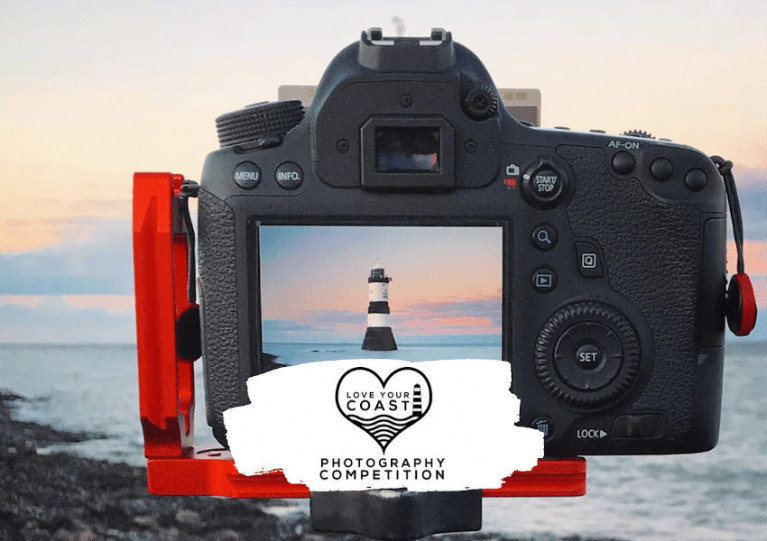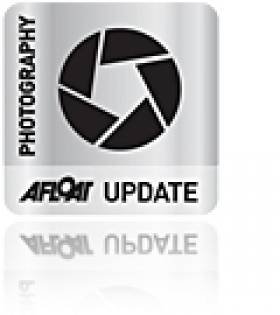Displaying items by tag: Love Your Coast
Clean Coasts have announced the winning photographers of the 14th edition of its Love Your Coast photography competition.
With a prize fund of €6,000, the competition has attracted hundreds of photographers all around Ireland this year, receiving a record number of over 1,300 entries.
Stephen Dunbar, with his “Humpback Feeding” captured in Broadhaven Bay, Co Mayo, won the Photographer of the Year title and first place in the Wildlife and the Coast category.
About the picture, Stephen said: “This image of a humpback whale was captured in Broadhaven Bay. I watched the whale feeding the day before from land. The next day, I was lucky enough to get out on a RIB with Brendan and Marcus from IWDG.
“We first encountered two huge basking sharks when they came over to our boat. After that, we found the humpback whale feeding in the bay with a handful of minke whales and lots of common Dolphins. Many birds feed in the bay, including kittiwakes, which are seen in the image, along with puffins, guillemots and razorbills.”
Winners in other categories included Peter Vandermeersch, for his photo “Horizon” in Bray, Co Wicklow in the Coastal Landscape category; Karol Ryan for “Sturgeon Moon, Ballycotton” in the Coastal Heritage category; Megan Gayda for “The Ocean Flare”, shot in Co Clare, in People and the Coast; Derek Bolton for “Emerald Jewel”, shot at Sovereign Island in Co Cork, in the Underwater category; and Robert Ledwith for “A Ray of Hope”, taken at Mullaghmore Beach in Co Sligo in Protectors of the Coast.
 Derek Bolton came first in the Underwater category as part of the 2023 Clean Coasts Love Your Coast photography competition with “Emerald Jewel”, taken in Sovereign Island in Co Cork
Derek Bolton came first in the Underwater category as part of the 2023 Clean Coasts Love Your Coast photography competition with “Emerald Jewel”, taken in Sovereign Island in Co Cork
In 2023, Clean Coasts celebrated its 20th anniversary of working with communities to help protect and care for Ireland’s waterways, coastline, seas, ocean and marine life.
Since 2010, the Love Your Coast photography competition has been a celebration of all the beauty and uniqueness of the Irish coast that Clean Coasts volunteers work to protect.
“Clean Coasts’ mission extends beyond a mere photography competition,” said Sinead McCoy, coastal communities manager. “Our coastal and marine environment form an integral part of Ireland’s identity. Through this competition, we invite the people in Ireland to appreciate, celebrate, and safeguard our coast, echoing the dedication of our over 2,000 volunteer groups working tirelessly to protect our marine environment.”
 Karol Ryan came first in the Coastal Heritage category as part of the 2023 Clean Coasts Love Your Coast Photography competition with “Sturgeon Moon, Ballycotton”, taken in Ballycotton, Co Cork
Karol Ryan came first in the Coastal Heritage category as part of the 2023 Clean Coasts Love Your Coast Photography competition with “Sturgeon Moon, Ballycotton”, taken in Ballycotton, Co Cork
See the top 50 images comprising the category winners and runners-up via the Clean Coasts website HERE.
Winners Selected in 2020’s ‘Love Your Coast’ Marine Photography Awards
The winners have been chosen in 2020’s Love Your Coast marine photography competition.
As the Irish Examiner reports, this year’s awards ceremony went virtual on Facebook Live, with the winning entries across four categories sharing in a €5,000 prize fund.
More than 40 images were shortlisted across the categories of Coastal Landscape, Wildlife & The Coast, People & The Coast and Coastal Heritage.
And the big winner was Ivan Donoghue, whose photos of divers — and specifically one encountering a jellyfish — earned him the overall award.
See the complete gallery of images on the Love You Coast website HERE.
#MarinePhotography - An Taisce president Prof John Sweeney was on hand to present prizes to the winners at Clean Coasts’ Love Your Coast Photography Awards, held on Friday 10 October at the Waterways Ireland Visitors Centre in Dublin's Docklands.
Celebrating five years of the Love Your Coast Photography Competition, the top images from past years were projected onto Boland Mills in a stunning photographic display that illustrated the wonder of our coast.
Ireland has some of the most spectacular and diverse coastline in the world, and Clean Coasts engages communities in protecting these beaches, seas and marine life now and for future generations.
Clean Coasts launched the Love Your Coast Photography Competition in May during Coca-Cola Clean Coasts Week, and with a prize fund of €4,000 it attracted huge interest from Ireland’s amateur photographers.
With thousands of entries, the panel of judges had a very difficult task indeed to choose the winners across the competition's four categories: Coastal Heritage (won by Des Daly for his shot of the Abandoned Coastguard Tower in Ardmore, Co Wicklow), Coastal Landscape (Vincent Coey, for White Horses Bearing Down White Rock in Killiney), People & The Coast (Ian Hennessy for Diver at Bullock Harbour) and Wildlife & The Coast (Brendan Cullen for Puffin in Flight, Saltee Islands, Co Wexford).
“The coast is a critically important environmental asset for Ireland," said Proif Sweeney at the awards evening. "It's dynamic nature and ability to respond to pressures both natural and human is excellently exhibited in these photographic entries.
"An Taisce congratulates those photographers who have captured the essence of the coast and elevated our appreciation of it to an art form.”
An electronic exhibition of Love Your Coast will be displayed at various locations nationally and internationally over the coming months. A gallery of the winning photographs can be found on www.cleancoasts.org or on Facebook.com/CleanCoasts.
Clean Coasts is operated by the Environmental Education Unit of An Taisce and is supported by the Department of the Environment, Community and Local Government, Coca-Cola and Fáilte Ireland.






























































